 W
WAugustin van den Berghe, was an 18th-century painter from the Southern Netherlands.
 W
WJean-Baptiste Berré or Jan Baptist Berré Antwerp, 11 February 1777 – Paris, 6 May 1839) was a Flemish painter and sculptor. He trained in Antwerp where he painted mainly still lifes. He later moved to Paris where he made a name as an animalier painter and sculptor. His patrons included members of the court during the First French Empire and the First Restoration. He was employed as an official painter at the Jardin du Roi in Paris. In this role he was chosen as one of the artists invited to portray Sarah Baartman, the 'Hottentot Venus', in 1815.
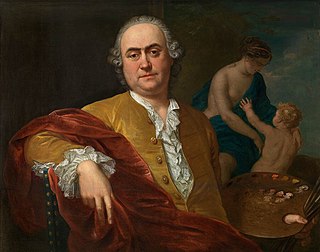 W
WBalthasar Beschey was a Flemish painter, draughtsman and decorative painter of interiors. He started his career as landscape painter but later on switched to history and portrait painting. He played a prominent role in the development of the Academy of Arts in Antwerp and as a teacher.
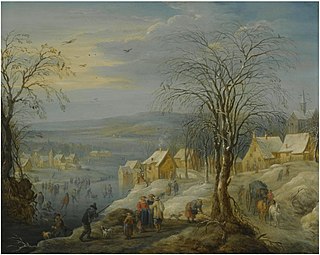 W
WCarel Beschey or Karel Beschey was a Flemish painter and draughtsman who mainly painted landscapes that were in the style of, or inspired by, the Flemish masters of the previous century and in particular Jan Brueghel the Elder.
 W
WJan Baptist Bosschaert or Jan Baptist Bosschaert the Younger was a Flemish still life painter who is principally known for his decorative still lifes with flowers. He collaborated with figure artists on compositions which combined allegorical or mythological scenes with a still life element. He was active in Antwerp.
 W
WFrans Breydel or Frans Breydel I was a Flemish painter, draftsman and decorative painter. He is known for his merry companies, carnival scenes, landscapes and battle pieces.
 W
WKarel Breydel or Carel Breydel, called 'Le Chevalier' was a Flemish painter of battle pieces, equestrian paintings and landscapes.
 W
WPieter Casteels III (1684–1749) was a Flemish painter and engraver mainly known for his flower pieces, game pieces and bird scenes. He spent a significant portion of his life in England where he had a varied career as a still life painter, printmaker and textile designer.
 W
WHendrik de Cort or Hendrik Frans de Cort was a Flemish landscape painter and draughtsman. His international career brought him to Antwerp, Paris, England and Wales. He is mainly remembered for his topographical paintings and drawings of English castles, country houses, parks and ruins.
 W
WJan Frans van Dael or Jean-François van Dael was a Flemish painter and lithographer specializing in still lifes of flowers and fruit. He had a successful career in Paris where his patrons included the Empresses of Empire France as well as the kings of Restoration France.
 W
WPaul-Joseph Delcloche, a Flemish painter of interiors and battle-pieces, was born at Namur in 1716. He was the son of Pierre Delcloche, an almost unknown painter, from whom he received his first lessons in art. Whilst still very young he went to Paris, but returned in 1747 to Liege, where he painted some pictures for the Salle des États and the churches. His small pictures are full of life and spirit, but his larger works are much less successful. He died in 1759.
 W
WJean-Bernard Duvivier was a painter and drawer of portraits and historical and religious subjects, a book illustrator and a professor at the Normal School in Paris. After having been instructed by Hubert and Paul de Cock and Suvée, he studied in Italy for six years. His style is characterised by balanced composition, lifelike drawing and bright colours.
 W
WJan Frans Eliaerts was a Flemish painter of animals, flowers, and fruit who migrated to France where he was active most of his life.
 W
WPieter Faes or Peeter Faes was a Flemish painter of still lifes of flowers and fruit. He worked in a decorative style close to that of Jan van Huysum.
 W
WCarel van Falens was a Flemish painter, draughtsman, copyist, art restorer, art dealer and copyist. He specialised in scenes of hunters and cavalry encampments in the popular style of the Dutch battle and horse painter Philips Wouwerman. He worked most of his life in France where he was a painter to the court and a member of the Académie royale.
 W
WJan Anton Garemyn (1712-1799), a Flemish painter and engraver, was born at Bruges, and studied under Louis Boons and Matthias de Visch. He painted numerous altar-pieces for the churches at Bruges and Courtrai; and others for private persons at Brussels and Ghent. His pictures are highly esteemed by his countrymen for their warmth of colouring. He painted several pictures in imitation of Rembrandt and Teniers, and designed and executed several of the plates for the Chronyke van Vlaenderen, published in 1736. He became professor in the Academy of Bruges, and died in that city in 1799.
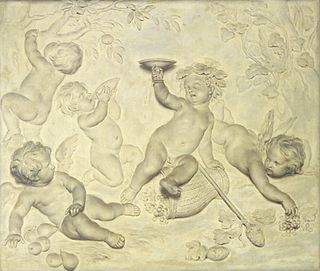 W
WMarten Jozef Geeraerts (1707–1791) was a Flemish historical painter. Born at Antwerp, he was intended for the law, and studied in the Jesuits' College. Preferring art, however, he became a pupil of Abraham Godijn, and was made free of the Guild of St. Luke in 1731. In 1741 he became one of the six directors of the Academy of Antwerp, who filled that office gratuitously. He died at Antwerp in 1791. He excelled in grisaille painting in imitation of bas-reliefs, of which there are the following examples:Antwerp. Gallery. The Fine Arts. 1760. Brussels. Gallery. Christ and the Disciples at Bmmaus, The Saviour at the House of Simon the Pharisee, The Sons of Aaron punished by Fire from Heaven, The Woman taken in Adultery, Abraham and Melchisedeck, The Sacrifice of Abraham and The Sacrifice of Eli Hague. Museum. Autumn. Lille. Museum. Children with Goat. Vienna. Gallery. Cupid and Psyche.
 W
WZeger Jacob van Helmont, was a Flemish painter and tapestry designer who specialized in portraits and history paintings. He trained with his father in Antwerp but spent his active career in Brussels where he worked for the local churches and tapestry works.
 W
WJacob Herreyns or Jacob Herreyns (I) Antwerp, baptized on 23 December 1643 – Antwerp, 1 January 1732) was a Flemish painter, printmaker and designer of tapestries. He worked in Antwerp where he painted many altarpieces. He was a known staffage painter who added the figures in the landscapes of other artists. As a printmaker, he produced mostly prints of mythological subjects. He held also the position of 'muntmeester' of Brabant.
 W
WWillem Jacob Herreyns was a Flemish painter of history subjects and portraits. He is regarded as one of the last painters in the tradition of the Flemish Baroque and the last follower of Peter Paul Rubens.
 W
WJan Josef Horemans the Elder (1682–1759) was a Flemish painter of the 18th-century. He was mainly known for his genre scenes but he also painted portraits and historical allegories.
 W
WJan Josef Horemans the Younger was an 18th-century Flemish painter. He is mainly known for his genre scenes but also painted harbor views, equestrian paintings, portraits and still lifes.
 W
WJan Baptist Huysmans was a Flemish painter active in Antwerp who is known for his Italianate and arcadian landscapes and architectural capricci.
 W
WVictor Honorius Janssens or Victor Honoré Janssens was a Flemish painter of religious and mythological works and a tapestry designer. He spent a substantial period of his career abroad and worked in Germany, Italy, Vienna and London. He was court painter of Emperor Charles VI of Austria in Vienna. He is mainly known for his mythological and history paintings.
 W
WJan Baptist Lambrechts was an 18th-century Flemish painter. He is mainly known for his genre scenes of drinkers, cooks, maids, vegetable salesmen and dancing farmers.
 W
WGiacomo van Lint or Jacob van Lint was an Italian landscape and vedute painter of Flemish descent active in Rome. He was the son of Hendrik Frans van Lint, one of the leading landscape painters in Rome in the first half of the 18th century. Like his father he supplied a clientele of local patrons as well as European travelers on their Grand Tour with views of the ancient and modern monuments of Rome as well as views of the Roman Campagna.
 W
WHendrik Frans van Lint was a Flemish landscape and vedute painter who was part of the group of Flemish and Dutch painters active in Rome. He was one of the leading landscape painters in Rome in the first half of the 18th century and his patrons included Rome's old aristocratic families as well as European travellers on their Grand Tour.
 W
WJan Baptist Monteyne or J.B. Monteyne was an 18th-century Flemish painter. He is mainly known for his genre scenes and landscapes.
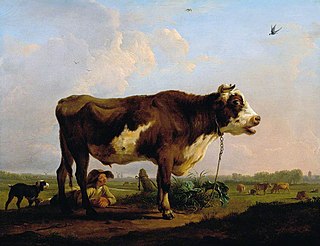 W
WBalthasar Paul Ommeganck (1755–1826) was a Flemish painter of landscapes and animals active in Antwerp. Through his work and his role as an art teacher and founder of art institutions he gave an important impetus to the revitalization of landscape painting in the Low Countries.
 W
WJoseph Paelinck, was a painter from the Southern Netherlands.
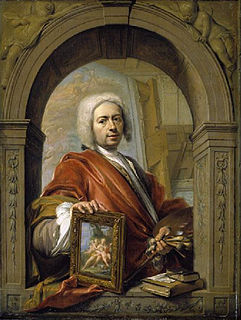 W
WJacques Ignatius de Roore or Jacobus Ignatius de Roore was a Flemish painter, copyist, art dealer and art collector who worked in the Southern Netherlands and the Dutch Republic.
 W
WAnthoni Schoonjans, nicknamed Parhasius was a Flemish painter known for his portraits as well as his history paintings. After training in Antwerp he had an international career, which saw him work in various countries in Europe including France, Italy, Germany, Austria, The Dutch Republic and Denmark. He was a court painter in Vienna, Copenhagen, Berlin and Düsseldorf.
 W
WFrans Balthazar Solvyns was a Belgian marine painter and journeyman artist, who lived in Calcutta between 1791 and 1803. He is considered one of the early pioneers in the field of print-making in India, along with Thomas Daniell.
 W
WJoseph-Benoît Suvée was a Flemish painter strongly influenced by French neo-classicism.
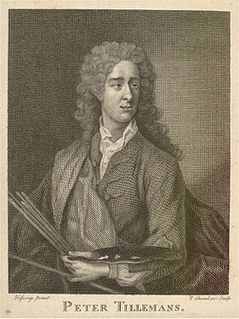 W
WPeter Tillemans was a Flemish painter, best known for his works on sporting and topographical subjects. Alongside John Wootton and James Seymour, he was one of the founders of the English school of sporting painting.
 W
WHenri Van Assche (1774–1841) was a Belgian painter.
 W
WGaspar Peeter Verbruggen or Gasparo Pedro Verbruggen was a Flemish still life painter who is principally known for his decorative still lifes with flowers and fruit. He collaborated with figure artists on compositions which combined figures with a still life element. He was active in Antwerp and The Hague.
 W
WMatthias de Visch or Matthijs de Visch was a Flemish painter of history paintings and portraits.
 W
WGeorges Frédéric Ziesel, was a Flemish flower and still life painter.